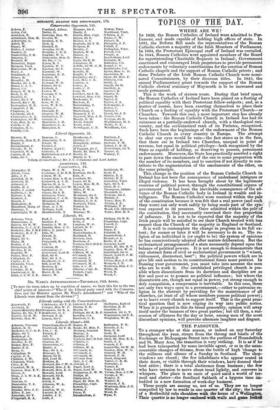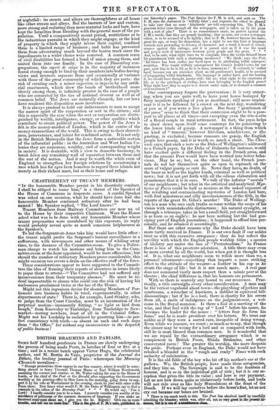THE PASSOVER.
To a stranger who at this season, or indeed on any Saturday throughout the year, strays from the throng. and bustle of the Exchange or Bishopsgate Street into the purheus of Houndsditch and St. Mary Axe the transition is very striking. It is ail if he had been transported by some invisible agent, or as in the unac- countable changes of dreams, from the bustle of high 'change to the stillness and silence of a Sunday in Scotland. The shop- windows are closed ; the few inhabitants who appear seated at their doors, or visible throue,01 their windows, have donned their best attire ; there is a total abstinence from business ; the few who have occasion to move about tread lightly., and converse in whispers. The place is an oasis of quiet amid a world of tur- moil and clatter—the fossilized Sabbath of a bygone time im- bedded in a new formation of week-day business. • These people are among us, not of us. They are no longer compelled by law to reside in one quarter of the city ; the house of a Rothschild rubs shoulders with the house of a Wellington. Their quarter is no longer enclosed with walls and gates locked
at nightfall : its streets and alleys are thoroughfares at all hours like other streets and alleys. But the barriers of law and custom, more strong and enduring than mere material locks and bars, have kept the Israelites from blending with the general mass of the po- pulation. Until a comparatively recent period, restrictions as to the industrious pursuits in which they might engage, or the kind of property in which they might invest their capital, confined them to a limited range of business ,• and habit has prevented them from adventuring much beyond the beaten track since the impediments to a wider choice were removed. A common sense of civil disabilities has formed a bond of union among them, and united them into one family. In the case of Dissenting con- • gregations, the esprit de corps is in the majority of instances found strong enough to bind up their members into bodies having views and interests separate from and occasionally at variance with those of the great community of which they are parts: the risk of creating such a minor imperium in imperio by any artifi- cial enactments, which drew the bonds of brotherhood more closely among them, is infinitely greater in the case of a people who are connected by the ties of national descent as well as of common belief. The Jews are naturally clannish, but our laws have rendered this disposition more inveterate. It is always prudent to hold out inducements to men to merge the narrow spirit of the corporation or sect in the citizen ; and this is especially the case when the sect or corporation are distin- guished by wealth, intelligence, energy, or other qualities which contribute to create political power. The power of the Jews is felt in the money-market of London, which is the centre of the money-transactions of the world. This is owing to their shrewd- ness, perseverance, and talent for combined action. It is not only in the British Metropolis that the Jews form a noticeable section of the influential public : in the Australian and West Indian Co- lonies they are numerous, wealthy, and of corresponding weight in society. It is desirable, with a view to domestic harmony, to break down any remaining wall of separation between them and the rest of the nation. And it may be worth the while even of England to strengthen her foreign relations by accustoming a race which has for ages been homeless to regard these islands not merely as their richest mart, but as their home and refuge.



























 Previous page
Previous page